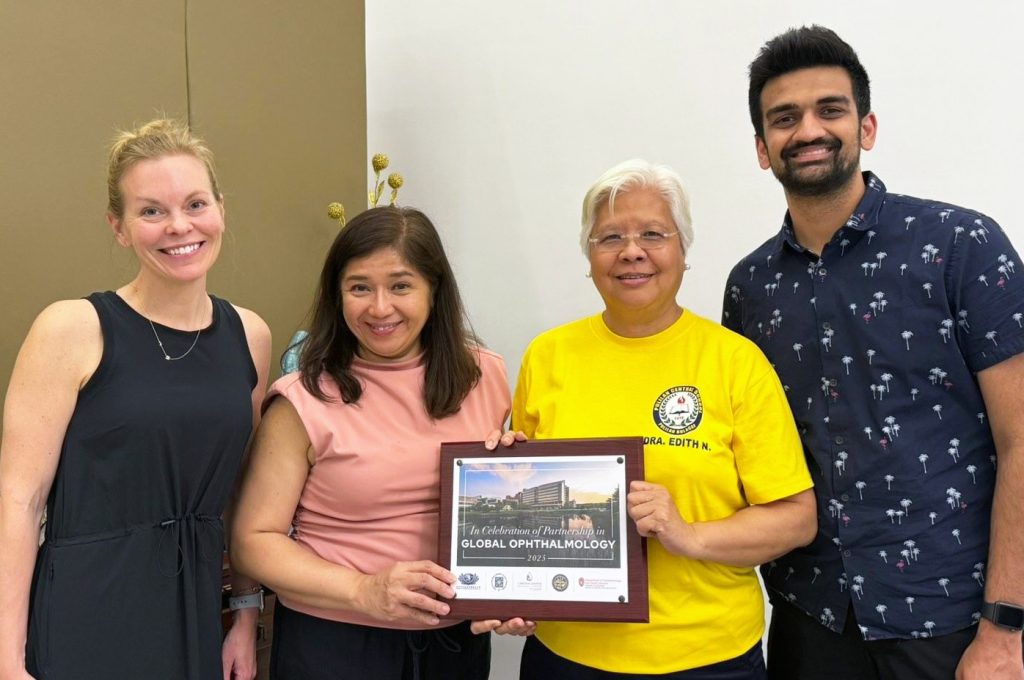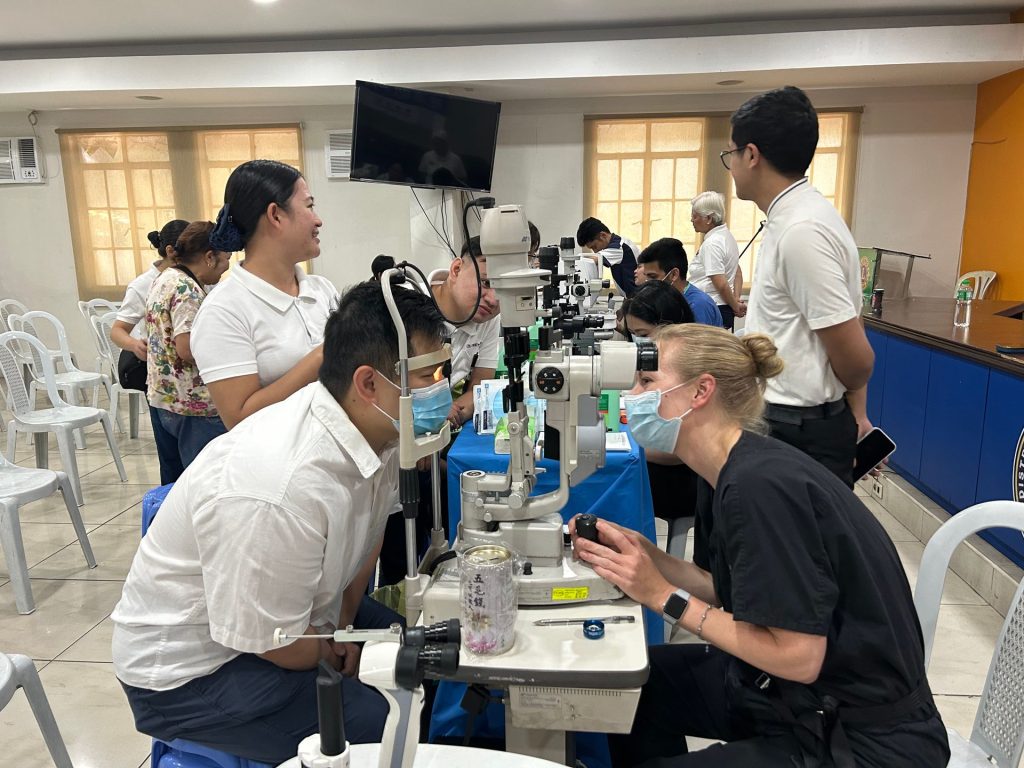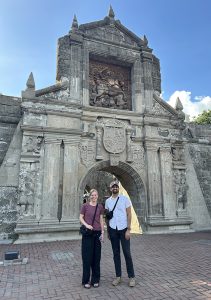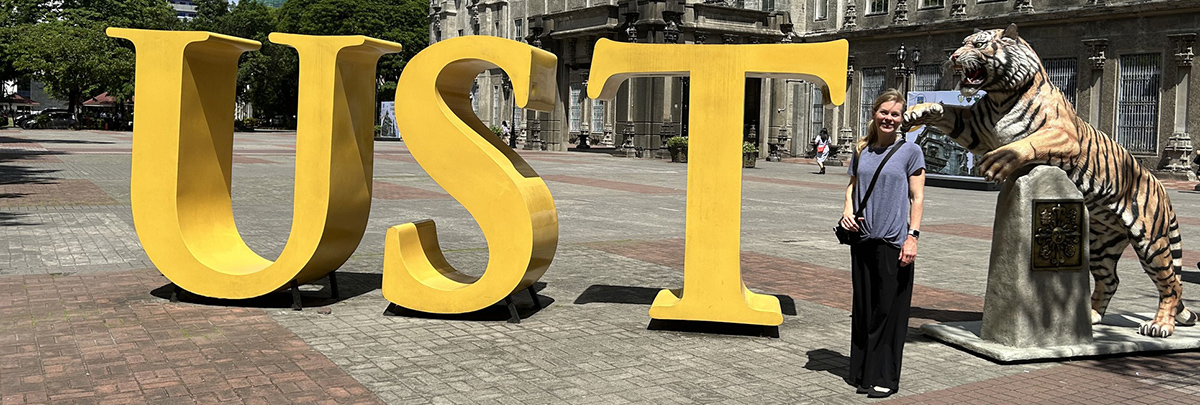What happens when surgical skill meets a passion for global health? For Dr. Christine Larsen, MD-a 2013 Glaucoma Fellow from the University of Wisconsin Department of Ophthalmology and Visual Sciences (DOVS)-the answer became clear during a ten-day mission in the Philippines. There, medicine became a powerful connector across cultures, and each patient encounter revealed stories of resilience and shared humanity.
With support from the Guillermo and Marta de Venecia Fund, Dr. Larsen joined ophthalmology resident Rushi Mankad, MD, to collaborate with local experts, exchange knowledge, and deliver sight-saving care in a region where preventable blindness remains a critical challenge.
From May 16–25, 2025, Dr. Larsen and Dr. Mankad worked alongside DOVS fellowship alumni Dr. Catherine Qui-Macaraig (Pediatric Fellow ’94) and Dr. Edith Navarro (Cornea Fellow ’95) at the Tzu Chi Eye Center, University of Santo Tomas (UST), UST-Hospital, and Cardinal Santos Medical Center.

While in the Philippines, Dr. Larsen actively participated in patient care and assisted in a wide range of procedures, including cataract surgeries and glaucoma cases. A generous donation of iStent surgical equipment from Glaukos Corporation enabled her to also share her experience with performing minimally invasive glaucoma surgeries, a procedure that was otherwise unavailable locally.
“For selected patients, the iStent offered a way to improve long-term eye pressure control while potentially reducing their dependence on glaucoma drops,” she said. “Seeing the enthusiasm and interest from the surgeons, as well as the potential benefit for patients, was incredibly rewarding.”

Her motivation for joining the rotation stemmed from a longstanding interest in global ophthalmology and a desire to better understand the unique challenges and innovative solutions in eye care outside the United States.
“The Philippines rotation offered the opportunity to both learn from and contribute to a dedicated team serving a population with a high prevalence of preventable blindness, particularly from cataract and glaucoma,” Dr. Larsen said. “The goal was to share my own surgical experience in this setting while gaining perspective on how care is prioritized and delivered when resources and access are limited.”
Dr. Larsen was deeply inspired by the surgical excellence and compassionate care demonstrated by Dr. Navarro and Dr. Qui-Macaraig.
“They exemplify a blend of surgical skill, efficiency, and compassion,” she said. “They not only welcomed me and Dr. Mankad into their operating rooms but also openly shared insights about patient selection, surgical decision-making, and the cultural aspects of care that influence outcomes.”
The rotation underscored how social, cultural, and economic factors profoundly shape eye care delivery. In many cases, even sight-saving procedures like cataract surgery are delayed until vision loss becomes severe due to cost, access, or cultural perceptions of surgery.
“This experience has broadened my perspective on patient counseling, prioritization of resources, and the importance of local partnerships in achieving sustainable impact,” she said.
Dr. Larsen was particularly impressed by the sustainability practices embedded in the daily workflow at Tzu Chi Eye Center. Thoughtful systems for sterilization, inventory management, and safe reuse of surgical instruments allowed the team to extend limited resources without compromising quality of care.

“This approach not only increases surgical volume but also ensures the clinic and operating room facilities can maintain consistent care delivery over time,” she noted.
Beyond the surgical cases, Dr. Larsen emphasized the warmth of the local team and the gratitude of the patients as unforgettable aspects of the experience.
“Even in brief encounters, patients expressed profound appreciation for the care they received,” she reflected. “Sharing meals and stories with the faculty and residents, learning about their training pathways, and seeing the pride they take in their work was as rewarding as the clinical experience itself. The trip reinforced for me that global ophthalmology is as much about human connection as it is about surgical skill and clinical care.”
The rotation also marked a full-circle moment for Dr. Larsen, who participated in international service experiences during her own residency.
“It was especially meaningful to help provide that same opportunity to another trainee as alumni faculty,” she said. “The partnership between our institutions is truly inspiring – built on mutual respect, cultural exchange, and collaborative learning. Global ophthalmology reminds us how much can be accomplished with limited resources and deepens our gratitude for the advantages we often take for granted within our own healthcare system.”

